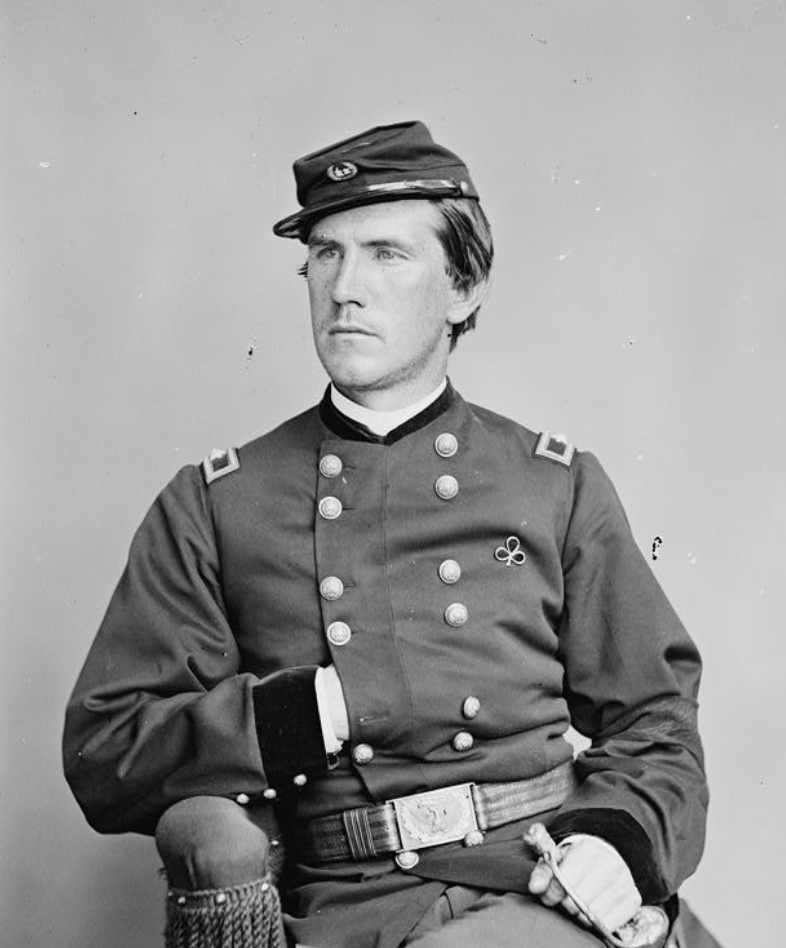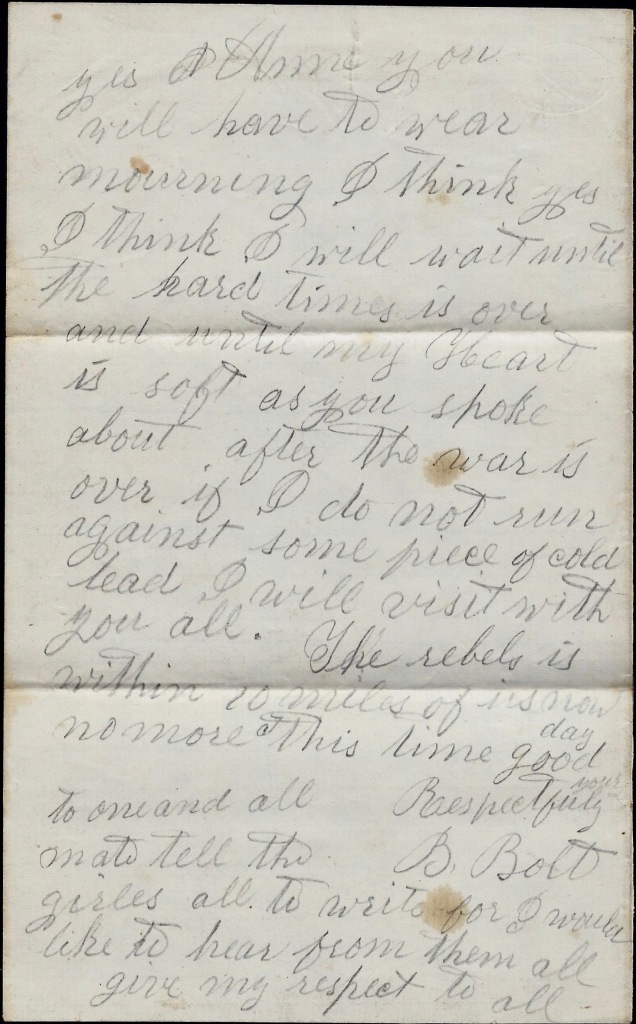This soldier’s signature looks to be “B. Bolt” or B. Bott” but I can’t find a soldier by that name in the 111th New York Infantry or the 126th New York Infantry, or even the 5th New York Light Artillery who were all surrendered at Harpers ferry in September 1862. He mentions that the regiment’s Lt. Col. was McDougall which would suggest the 111th New York but I can’t find anyone by that name in the regiment—particularly in Co. H which was recruited in Cato.
He wrote the letter to his cousin Mary Elizabeth Joralemon (1844-1933), the daughter of John J. Joralemon (1808-1873) and Abigail Conklin (1810-1874) of Cato, Cayuga county, New York.
The letter mentions the Battle of Harpers Ferry in September 1862 in which Gen. Dixon S. Miles, without putting up much of a fight or even delaying Gen. Stonewall’s Jackson’s men to prevent them from proceeding on to the Battlefield at Antietam, surrendered the town and over 12,000 Union prisoners. The prisoners were sent to Annapolis where they were processed as prisoners of war and sent to Camp Douglas in Chicago. The Union Army used the facility as a detention camp for paroled Confederate prisoners (these were Union soldiers who had been captured by the Confederacy and sent North under an agreement that they would be held temporarily while formal prisoner exchanges were worked out). In December 1862, they were finally declared exchanged and allowed to return to service.
Transcription

[Centreville, Virginia]
December 6th 1862
Dear Girls,
With pleasure I received your pleasant letter yesterday and was pleased to hear from you and to hear of the weddings about Cato, to think of the nice times they are having there. As Uncle John wanted to hear the particulars, I will write some of them.
The 26th of November we left Camp Douglas for Washington. We had good cars all of the way to Baltimore and the tables was ready to receive at some of the places. We got supper at Baltimore, then we got on some government cars for Washington. The cars was no better than out doors and the weather was cold. We had to stomp [or feet] and raise old hob to keep warm. We arrived at Washington at daybreak, Sunday 30th. We staid there until Monday, December 1st, then we marched about 4 miles west of the city, across the Potomac in Virginia, and camped on a side hill that night on new land where there was plenty of brush. [It was] rather cold to sleep out doors although it is nothing for a soldier.

The next day we pitched tents and stayed there one night, then struck [them] the next morning and marched south about 4 miles, just past the Fairfax Seminary, then pitched tents and slept in them than night. Then traded tents with a regiment close by us. They just moved away and last night we slept in them. The weather has ben very nice until day before yesterday. About 200 of our regiment went on picket. Just as soon as they had got to camp, they was hungry, cold and tired, and nothing to carry with them to eat, so our Lieut. Colonel [Clinton Dugald] McDougall gave one of the boys $10 to go to the bakery to buy bread for the pickets. And yesterday it commenced to snow and rain and it was pretty cold sleeping in the tents without stoves and nothing but hard tack and coffee.
Perhaps you would like to know how the sutlers sell things. Ham, dried beef, cheese, bologna, 20 cents a pound, butter 40, pies 20 cents apiece. Rather tough doings but no more than I expected. I am content [and have] good health—that is worth all to a soldier.
Gilbert, you wanted me to shoot some rebels for you. I did my duty at Harper’s Ferry until [Gen. Dixon S.] Miles sold us [out], guns and everything, to [Stonewall] Jackson. The damn old traitor. I am glad he [Miles] is dead. We have got some guns just like the other ones and I guess Old Jackson won’t get them as easy. 1
Anna, you wanted me to excuse you. I do excuse for a letter from a friend comes good when it comes—better late than never. I am very glad my Dogtype [daguerreotype] looks natural. I presume you know that Nels has left the regiment. Wash and Sant is well. Girls, you spoke about the heart disease and cloven feet cowards [who are] afraid to be a soldier. I like it. If our regiment was discharged today, I would enlist in Heavy Artillery as soon as I could visit my friends. I am not afraid of death. It is the least think I think of. I have a soldier’s heart—one that fears not the rebels’ guns.
Yes, Anne, you will have to wear mourning, I think. yes, I think I will wait until the hard times is over and until my heart is soft, as you spoke about, after the war is over. If I do not run against some piece of cold lead, I will visit with you all. The rebels is within 10 miles of us now. No more at this time. Good day. Respectfully yours, — B. Bolt
To one and all. Mate tell the girls all to write for I would like to hear from them all. Give my respect to all.
1 The Confederate Army sustained 286 casualties (39 killed, 247 wounded), mostly from the fighting on Maryland Heights, while the Union Army sustained 12,636 (44 killed, 173 wounded, 12,419 captured). The Union garrison at Harpers ferry also surrendered 13,000 small arms, 200 wagons, and 73 artillery pieces. It was the largest surrender of Federal forces during the Civil War.




